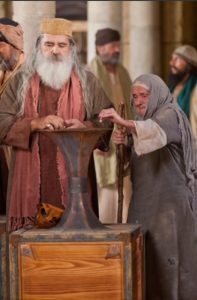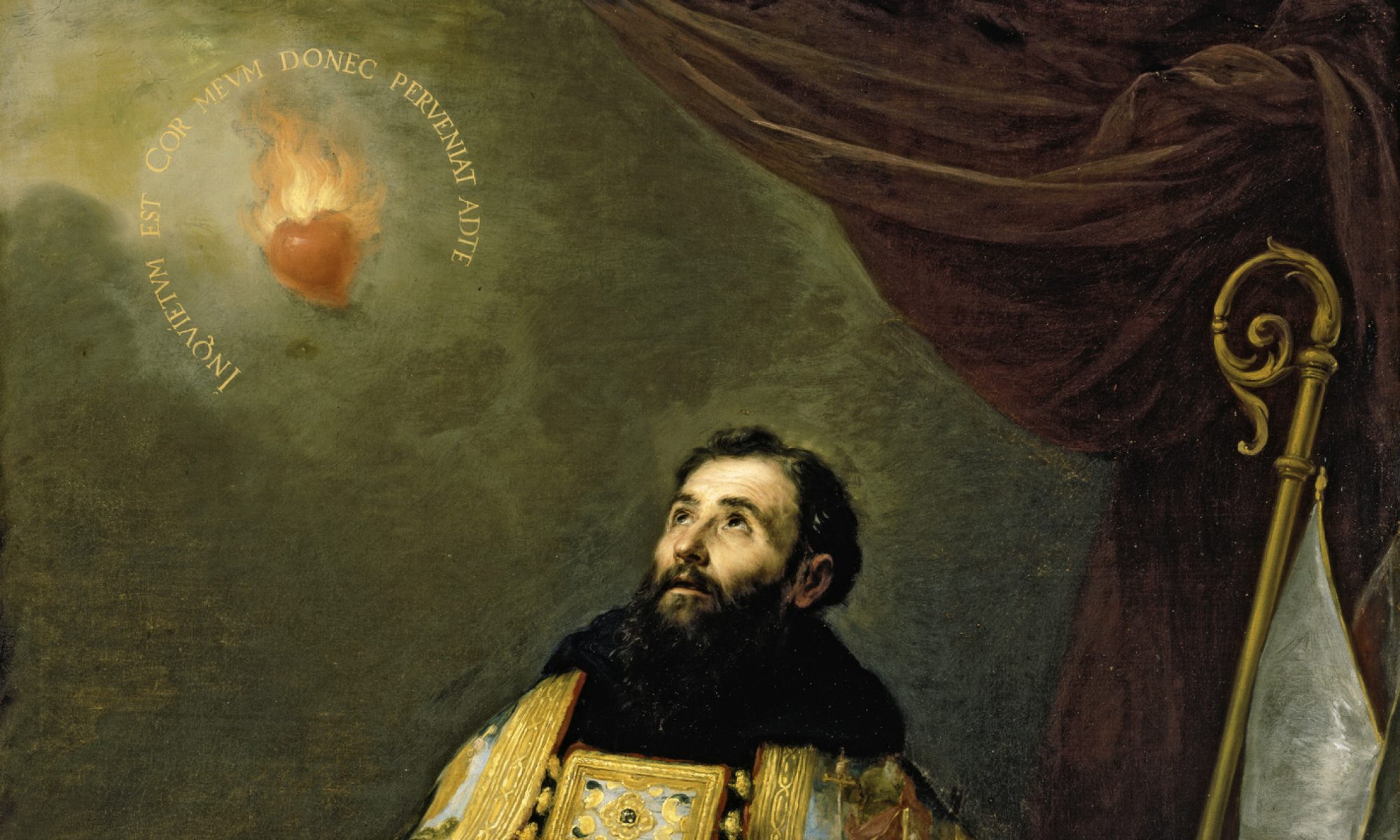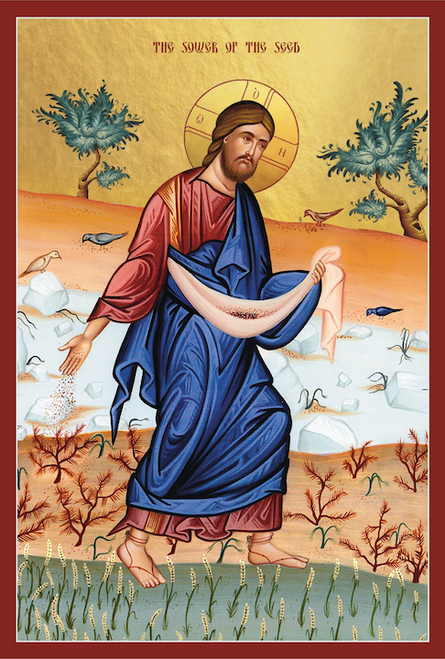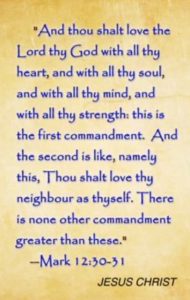We have a new President; we have the responsibility to pray for him. I hope that we will be supporting him despite our different political affiliation. As Catholics, we must show respect to both civil authorities and ecclesiastical authorities. We are one nation under God, indivisible, which we need to truly honor and respect.
Let us try to set aside political bickering and seek healing of our people, our country. When we encounter people holding signage that says, “In our candidate, we trust,” I feel that sign to be uncomfortable for me and I need to process the heart’s discomfort. I think that it is also an obvious sign that people are expecting someone to restore our serious divides and look forward to a brighter future. However, I would like to put this into proper perspective that the only one that can truly provide our desire and hope for our country is none other than our Lord Jesus Christ, He has all the authority and power over us to live a life of contentment, happiness and peace.
The readings in today’s liturgy present us with the story of two women outstanding in their generosity. The first woman Elijah encounters in his travels is poor, with a son, who needs to survive with a meager supply of flour and oil, but they were able to survive because the “jar of flour did not go empty, nor the jug of oil run dry, as the Lord had foretold through Elijah.” (v.16) The widow fulfilled what she was asked to do. She was also generous to obey when Elijah told her to first make a little cake and bring it to him.
The 2nd reading is taken from the letter to the Hebrews and reminds us that the first appearance of Jesus has changed everything through His death “to take away sins by His sacrifice.” Jesus is the High Priest who exactly “did not enter into a sanctuary made by hands, a copy of a true one, but heaven itself that He might now appear God before on our behalf.” (v. 24). When Jesus appears a second time, it is not to take away sins of God’s children, but to graciously bring with Him the promise of salvation. Let us remember that He is a good Judge and a merciful Savior. It surely requires true repentance and conversion so that we can graciously be destined to receive salvation that is eternal life lived in God’s glorious presence in the new earth and new heaven.
The gospel today from St. Matthew recounts the story of Jesus observing people putting money into the temple treasury. Those who are rich have given large amounts, but Jesus noted that the poor widow put a couple of pence into the treasury indicating that she was giving not a surplus from her livelihood. To Jesus she was able to give more out of her poverty than the rich people who gave much from their surplus.
What are the important lessons we can get from this beautiful story?
First, for a person who lives in poverty. there is no reason or hindrance to be generous. We have observed that God blessed us and has abundantly given us from our own poverty of spirit, like one’s poverty calls us to a deep and profound faith, hope and love. Have you ever thought that Elijah, the prophet, helps the widow to overcome her poverty just like Jesus, our Savior, responds to all the people He encounters throughout His ministry of preaching and healing, and providing to those people in need. I am generous when I have nothing to give but am humbled and trust in the Lord that I can be compassionate in other ways, like prayer and showing righteousness. If I have something to give, I see to it that I have the heart to share with those I have missed to help. I do believe that my heart is full of the capacity to do what the Lord is asking me to do, that is to be generous materially, with time and love for others. We must learn to accept that the Lord helps us in many ways by trusting Him and then finding ourselves having much to share.
Second, I believe that dependence upon God is crucial and necessary. Instead of asking for more material wealth, why don’t we pray for help to be generous at all times even though we may notice that even we ourselves need help, but there are those with greater need than us. It is sometimes common to us that our reason for refusing to help is because we have nothing to give. Let us be ready to be dependent on God and give from our own poverty. I do believe that poor people have the ability to share with those who are rich, by their simplicity, dependence and love of God. Thus, in any circumstance, I feel that the world needs my charity, but I also do what I must to take care of my personal needs.
Third, this story connects with our duty to love God and our neighbor. The widow is in the temple to perform her ritual of loving God according to her religious tradition. She has given from her meager income to share with others as well. I can see that her action points to a deeper reality of the ways of Jesus and, besides, the temple collected monies to provide necessary provisions for the maintenance and expenses incurred and for other charitable works.
Our Christian attitude to give something to the temple, or to our parish, holds our belief that the more we give leads us back to God, who is a good provider. Jesus makes much of our own poverty to be generous, thus Jesus blesses how we will love Him and our neighbor. This is a belief that if you care for your neighbor, God will certainly care for you. Never compare the amount you have given to others in need; just respond positively. If you are reluctant to give, perhaps you would be discouraged to find out how you doubt your capacity to give from your surplus. It is also said that those of us who are poor often give, even from what we need.
With our conscious reflection of today’s readings, we are encouraged to ask for the grace to give more from the deepest recesses of our hearts. We need this kind of generosity from us. Who among my family, friends and those whom I am not aware of, could I now give to? Do I have the faith and courage to give my last cent?
God bless you.
Fr. Arlon, osa
————
El Dictado del Corazón
Trigésimo-segundo Domingo del Tiempo Ordinario, Año B (10 de Noviembre)
- 1 Reyes 17:10-16
- Salmos 146:7, 8-9, 9-10
- Hebreos 9:24-28
- Marcos 12:38-44
Tenemos un nuevo Presidente y tenemos la responsabilidad de orar por él. Espero que lo apoyemos a pesar de nuestras diferentes afiliaciones políticas. Como católicos, debemos mostrar respeto a las autoridades civiles y a las autoridades eclesiásticas. Estamos en una nación bajo Dios, indivisible, a la que honramos y respetamos.
Intentemos dejar a un lado las disputas políticas y busquemos sanar tanto al pueblo como al país. Cuando nos encontramos con personas con carteles que dicen: “Confiamos en nuestro candidato”, siento que ese cartel se vuelve incómodo para mí y necesito procesar el malestar de nuestros corazones. Creo que también es una señal obvia que muestra la desesperación de algunas personas que esperan que alguien restablezca las divisiones y espera un futuro mejor. Sin embargo, me gustaría poner esto en una perspectiva adecuada: el único que verdaderamente puede satisfacer nuestro deseo y esperanza para nuestro país no es otro que nuestro Señor Jesucristo. Él tiene toda la autoridad y poder sobre nosotros para vivir una vida de sanción, felicidad y paz.
Las lecturas de hoy presentan las historias de dos mujeres destacadas por su generosidad. La primera mujer que Elíasencuentra en su viaje. Ella es pobre con su hijo y necesita sobrevivir con una escasa provisión de harina y aceite. Sin embargo, sobreviven porque “no se acabó la tinaja de harina, ni se secó el cántaro de aceite, como el Señor había predicho por medio de Elías” (v.16). La viuda cumplió lo que le pedían, y también fue generosa al obedecer lo que Elías le dijo, de hacer primero una pequeña torta y llevársela.
Segunda lectura de la carta a los Hebreos. Nos recuerda que la primera aparición de Jesús cambió todo a través de Su muerte “para quitar los pecados con Su sacrificio”. Jesús es el Sumo Sacerdote que exactamente “no entró en un santuario hecho por manos, copia de uno verdadero, sino en el cielo mismo, para presentarse ahora ante Dios a favor de nosotros”. (v. 24). Cuando Jesús venga por segunda vez, no para quitar los pecados de los hijos de Dios, sino para traer con Él la promesa de salvación. Recordemos que Él es un buen Juez y un Salvador misericordioso. Requiere verdadero arrepentimiento y conversión para que podamos recibir en gracia la salvación que es vida eterna vivida en la gloriosa presencia de Dios en la tierra nueva y un nuevo cielo.
El evangelio de hoy de San Mateo relata la historia de que, en una ocasión Jesús estaba sentado frente a las alcancías del templo, mirando cómo la gente echaba allí sus monedas. Muchos ricos daban en abundancia. En esto, se acercó una viuda pobre y echó dos moneditas de muy poco valor, indicando que no estaba dando lo que le sobraba. Para Jesús, ella pudo dar de su pobreza que los ricos que dieron mucho de lo que les sobraba.
¿Cuáles son las lecciones importantes que podemos sacar de esta hermosa historia?
Primero, una persona que vive en pobreza no es por ningún motivo un impedimento para ser generoso. Hemos observado que Dios nos bendice y nos da abundancia en nuestra pobreza de espíritu, como la pobreza de uno, nos llama a una fe, esperanza y amor profundo. ¿Alguna vez has pensado que Elías, el profeta ayuda a la viuda a superar su pobreza al igual que Jesús, nuestro Salvador responde a todas las personas que encuentra a lo largo de su ministerio de predicación y sanación que provee a las personas necesitadas? Soy generoso cuando no tengo nada para dar, pero me humillo y confío en el Señor para que pueda ser compasivo de otras maneras, como en la oración y mostrando rectitud. Si tengo algo para dar, me aseguro de tener el corazón para compartirlo con aquellos que son mis semejantes. Creo que mi corazón está lleno de la capacidad de hacer lo que el Señor me pide que haga, es decir, ser generoso materialmente, con tiempo y amor para los demás. Debemos aprender a aceptar que el Señor nos ayuda de muchas maneras al confiar en Él, y luego encontrarnos con mucho amor para compartir.
En segundo lugar, creo que la dependencia de Dios es crucial y necesaria. En lugar de pedir más riqueza material, ¿por qué no oramos para ser generosos en todo momento, aunque notemos que incluso nosotros necesitamos ayuda y que hay quienes tienen una necesidad mayor que nosotros? A veces es común para nosotros que nuestra razón para negarnos a ayudar es que no tenemos nada para dar. Estemos dispuestos a depender de Dios y dar de nuestra pobreza. Creo que los pobres pueden compartir con los ricos, por su sencillez, dependencia y amor a Dios. Por eso, en cualquier circunstancia, siento que el mundo necesita mi caridad y hago lo que debo hacer también para cuidar de mis necesidades personales.
En tercer lugar, esta historia se conecta con nuestro deber de amar a Dios y a nuestro prójimo. La viuda está en el templo para realizar su ritual de amar a Dios según su tradición religiosa. Sus escasos ingresos han dejado de ser compartidos con los demás también. Puedo ver que su acción apunta a una realidad más profunda de los caminos de Jesús. Además, el dinero recaudado en el templo proporciona las provisiones necesarias para el mantenimiento y los gastos incurridos y para otras obras de caridad. Muchos católicos hacen donaciones durante el ofertorio, un dólar que refleja el valor de uno mismo a los ojos de Dios. El ofertorio es como dar una propina después de cenar en el restaurante. Lo que ofreces habla de ti mismo.
Nuestra actitud cristiana de dar el diezmo al templo o a nuestra parroquia sostiene nuestra creencia de que cuanto más damos, más nos lleva a Dios, quien es un buen proveedor. Jesús da mucha importancia a nuestra propia pobreza para ser generosos, así, Jesús bendice cómo lo amaremos a Él y a nuestro prójimo. Esta es la creencia de que si te preocupas por tu prójimo, Dios ciertamente cuidará de ti. Nunca compares la cantidad que has dado a otros necesitados, simplemente responde positivamente. Si eres reacio a dar, quizás te desanimes al descubrir cómo dudas de tu capacidad para dar. También se dice que los que somos pobres muchas veces damos, incluso de lo que necesitamos.
Con nuestra reflexión consciente sobre las lecturas de hoy, se nos anima a pedir la gracia de dar más desde lo más profundo de nuestro corazón. Necesitamos este tipo de generosidad de nuestra parte. ¿Quiénes son mis familiares, amigos y aquellos de quienes no soy consciente, que ahora podría dar? ¿Tengo la fe y el coraje para dar mi último centavo?
Dios los bendiga.
P. Arlón, osa




